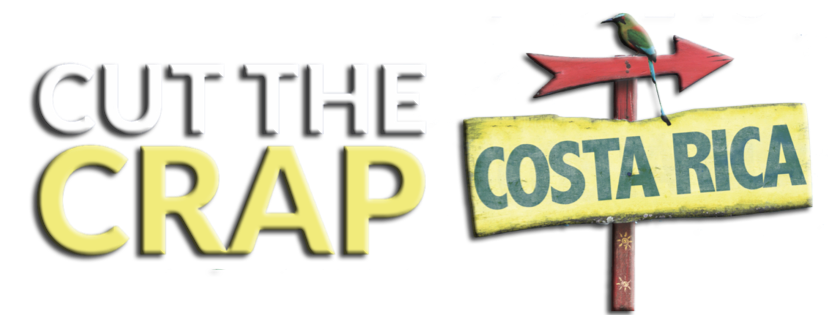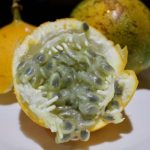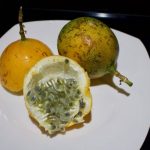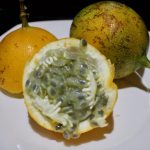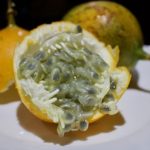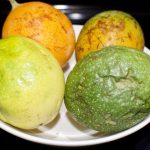Granadilla – Passion Fruit
1 Fruit: ₡200 ≈ $0.33


Granadilla - Passion Fruit is a very common fruit you can find throughout Costa Rica. There are two varieties of passion fruit: the granadilla and the maracuyá. The difference between them is kind of like that of red and green apples; however, passion fruit tastes nothing like apples. The granadilla is usually the preferred version, as it is much sweeter and has a clear/translucent juicy pulp. The maracuyá is more sour, especially the reddish colored version with a yellowish pulp.
Nikki prefers the sour maracuyá with a sprinkle of salt, while the rest of us prefer the sweeter granadillas. Most people spit out the seeds as you do with watermelons, but Nikki eats the seeds, as they have many health benefits. Either version works great in a smoothie and don’t worry about the seeds because you can blend them up with the rest of the pulp. While the seeds are safe to eat, the fruit's hard outer skin isn't usually considered edible.
Nutrition information for granadilla - passion fruit is based on the standard passion fruit. No specific information was available for the Costa Rica species.
Health benefits of Granadilla & Maracuyá - Passion Fruit:
1. Boosts Immunity - through antioxidants.
2. Protects Cells- with antioxidants.
3. Promotes Eye Health - through high Vitamin A levels.
4. Helps Digestion - due to its rich fiber content.
5. Improves Heart Health and Reduces Blood Pressure - with high potassium levels.
6. Improves Circulation - with potassium, iron, and copper.
7. Helps Bone Health - from iron, copper, magnesium, and phosphorus.
8. Reduces Insomnia - through Harman, a medicinal alkaloid compound.
1 servings
1 Whole Fruit
- Amount per serving
- Calories17
- % Daily Value *
- Total Fat .1g1%
- Saturated Fat 5g25%
- Total Carbohydrate 4.2g2%
- Dietary Fiber 1.9g7%
- Total Sugars 2g
- Protein .4g
- Vitamin A 4mcg1%
- Vitamin C 9mg10%
- Iron 1mg6%
- Potassium 62.6mg2%
- Magnesium 1mg1%
* The % Daily Value (DV) tells you how much a nutrient in a serving of food contributes to a daily diet. 2,000 calories a day is used for general nutrition advice.
